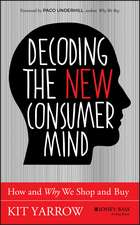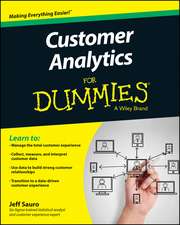Perspectives on Methodology in Consumer Research
Editat de David Brinberg, Richard J. Lutzen Limba Engleză Paperback – 14 dec 2011
Preț: 389.49 lei
Nou
74.53€ • 78.01$ • 62.03£
Carte tipărită la comandă
Livrare economică 31 martie-14 aprilie
Specificații
ISBN-10: 146138611X
Pagini: 301
Ilustrații: 301 p.
Dimensiuni: 155 x 235 x 17 mm
Greutate: 0.45 kg
Ediția:Softcover reprint of the original 1st ed. 1986
Editura: Springer
Colecția Springer
Locul publicării:New York, NY, United States
Public țintă
ResearchCuprins
I Philosophical Orientations.- 1 Art Versus Science as Ways of Generating Knowledge About Materialism.- Traditional Antipathy of Art and Science.- Applications of Art to Materialism.- How Do Art and Science Differ as Approaches to Knowledge?.- Art’s Potential Contributions to Consumer Behavior.- Conclusion.- 2 Implications from the “Old” and the “New” Physics for Studying Buyer Behavior.- Psychology as a Traditional Science.- The Influence of Marketing.- Goals of the “Old” Science.- Implications from the “New” Science.- Affect, Cognition, and Purchasing Intention.- Conclusion.- II Analytic Strategies.- 3 An Idiothetic Analysis of Behavioral Decision Making.- Limitations of Nomothetic Treatment of Data.- An Idiothetic Approach to Behavioral Decision Making.- Concluding Remarks.- 4 Building Consumer Behavior Models with LISREL: Issues in Applications.- The LISREL Model.- Applications.- Application 1: Validity Assessment and the Attitude-Behavior Relationship.- Application 2: Inequality Constraints.- Application 3: MTMM Data.- Issues and Caveats in Applications.- Issue 1: Do We Really Believe Our Models?.- Issue 2: Empirical Identification.- Issue 3: Offending Estimate.- Issue 4: Interpretational Confounding.- Concluding Remarks.- 5 Meta-Analysis: Techniques for the Quantitative Integration of Research Findings.- Integrating Research Findings: A Brief Historical Review.- Increasing Our Confidence and Understanding in a Research Finding.- Quantitative Procedures.- Summary and Conclusions.- 6 Social Interaction Data: Procedural and Analytic Strategies.- Social Interaction Research in Marketing and Consumer Behavior.- Observational Coding Systems.- Analytic Strategies for Social Interaction Data.- Using Social Interaction Data for Theory Development.- III Applications.- 7 Expanding the Ontology and Methodology of Research on the Consumption Experience.- The Consumption Experience.- Ontology: An Expanded Model of the Consumption Experience.- Systemic Inter-Relationships and Overlaps in the Consumption Experience.- Methodology: Some Extensions in Techniques for Studying the Consumption Experience.- Conclusion.- 8 A Theory of the Inductive Learning of Multiattribute Preferences.- Theory.- Discussion.- Appendix 1. The Pattern Recognition Algorithm.- Appendix 2. The Evaluation Algorithm.- Author Index.
Descriere
Methodological advances in consumer behavior are increasing rapidly. We can characterize these advances by work in two logically separate but functionally related areas: (a) the philosophical underpinnings of our methods, and (b) the analytic strategies for examining the phenomena of interest in the field. An important aspect in communicating these advances is the demonstration of their use on focal problems in consumer behavior. Current research strategies and analytic techniques in the field of consumer research reflect the dominant logical empiricist epistemology. The develop ment of new epistemologies (e.g., scientific relativism, hypothetical realism), however, is likely to modify the dominant logical empiricist approach and is also likely to influence the analytic strategies used to conduct research. For instance, with the increased awareness of scientific relativism and hypothet ical realism, greater emphasis is anticipated for idiographic rather than nomo thetic designs, for observational rather than experimental designs, for process rather than static analyses, and for more sophisticated techniques for summariz ing findings across studies. The major theme underlying this volume is that conceptual, analytic, and sub stantive diversity are essential for consumer behavior research to advance. Col lectively, the chapters we present in this volume are a diverse set of perspectives for the study of consumer behavior. This volume is organized into three parts: (1) philosophical orientations toward consumer behavior research, (2) analytic strategies for consumer behavior research, and (3) applications of these orientations and strategies to current research areas.



















